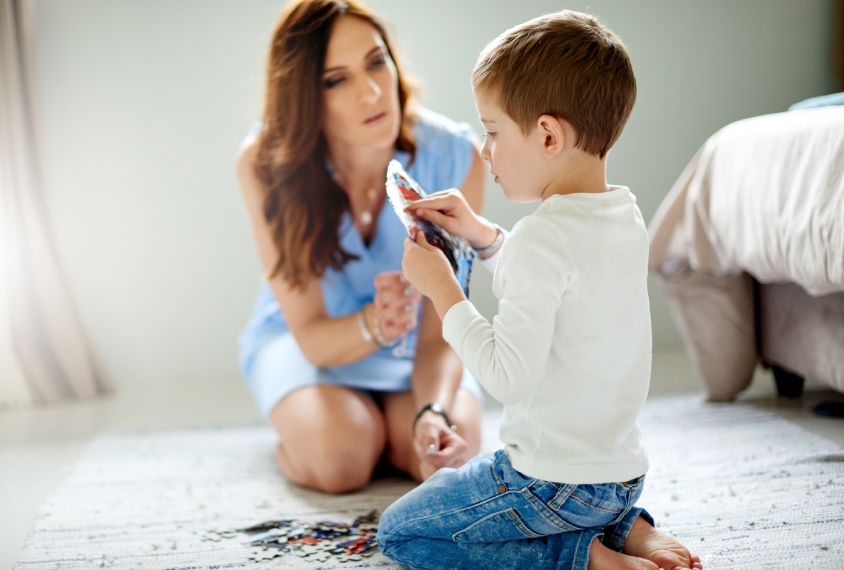
Parent perceptions may contribute to placebo problem in autism
Parents of children with autism report improvements in their children’s behaviors when they participate in a study, even when the children are not receiving a treatment.
Parents of children with autism report substantial improvement in their children’s behaviors when they participate in a study, even when the children are not receiving a treatment, a new study suggests1. By contrast, clinician ratings of the children’s autism features do not vary.
It’s unclear why the parents’ and clinicians’ ratings do not agree.
“We don’t know if the kids changed a little or if the parents just thought they changed,” says lead investigator Catherine Lord, director of the Center for Autism and the Developing Brain at New York-Presbyterian Hospital in New York City.
In either case, the findings suggest that just participating in research can influence parent responses. These gradual shifts in parents’ perception of their children’s difficulties may contribute to the large placebo effect seen in autism trials. The study was published 12 April in Autism Research.
The findings were unexpected: Lord and her colleagues set out to test sensors worn on a child’s body to record language use, movements and other behaviors. They wanted to see how feasible it is for parents to keep these sensors on their children for eight weeks — the typical length of a clinical trial. They also planned to compare the sensor data with parent reports of the children’s behavior. The children in the study continued with any existing treatments, but received no additional therapy.
To their surprise, the researchers found that some parents reported improvements in their children’s behaviors.
“We didn’t expect that anything would change,” says Rebecca Jones, assistant professor of neuroscience in psychiatry at Weill Cornell Medical College in New York. “Coming to our clinic and participating in a study and all that goes along with it — that somehow potentially impacted how parents viewed their child’s behavior.”
Non-treatment response:
Parents of 20 children with autism visited Lord’s clinic in New York to complete five questionnaires about their children’s social difficulties, repetitive behaviors and mood. The researchers recorded 12-minute videos of each child playing with a research assistant. They also trained the parents to operate two wearable devices: the LENA system, which records the child’s language use, and a wristband that monitors movements, heart rate and sweat levels.
Once a day for the following eight weeks, parents rated their child’s irritability, stress levels and disruptive behavior from home, using a smartphone app. At the end of the eight weeks, the families returned to the clinic to repeat the questionnaires and videos. Clinicians who were unaware of the purpose of the study viewed the videos and rated each child’s autism features.
At least 80 percent of parents reported improvements in their children on two of the questionnaires at the second clinic visit. Total scores improved by 29 percent on the Aberrant Behavior Checklist, particularly in the areas of hyperactivity, irritability and inappropriate speech; scores also improved by 7 percent on the Social Responsiveness Scale, which measures social and communication difficulties.
“Significant change in two caregiver ratings suggests that improvements may be seen over time in a research study regardless of whether any treatment is provided,” says Jeremy Veenstra-VanderWeele, associate professor of psychiatry at Columbia University, who was not involved in the study. “It’s useful to know that this non-specific change can be substantial, even in the absence of treatment.”
Placebo problem:
Parent responses did not change significantly on the other three questionnaires, which measure mood, repetitive and other behaviors. Their responses also did not change significantly on the smartphone questions.
Clinicians did not detect any significant changes over time in the children’s autism features.
That could either mean that their ratings of the children’s behaviors are more accurate than parent ratings, or that they do not detect subtle changes that parents pick up, Veenstra-VanderWeele says.
In either case, this result is at odds with previous findings from clinical trials.
“I find that surprising, because that is contrary to what is usually the case,” says John Jay Gargus, director of the Center for Autism Research and Translation at the University of California, Irvine, who was not involved in the study. “In real clinical trials, where you set up a placebo group, the clinical assessments also show the placebo effect.”
Lord says one explanation is that the clinicians in her study were not expecting the children to change, whereas in a clinical trial there may be an implicit expectation of improvement because some children receive treatment.
Autism trials may be especially vulnerable to the placebo effect because the condition is diagnosed behaviorally and lacks biological markers.
Children’s behaviors also naturally fluctuate, further compounding this problem. “Behavior can really truly change without treatment sometimes,” says Bryan King, vice chair of child and adolescent psychiatry at the University of California, San Francisco, who was not involved in the study.
The placebo effect in parents may arise from their expectation of improvement, which is reinforced by repeated interactions with researchers, increasing familiarity with questionnaires, or the training and education gained by participating in research.
The new study cannot be interpreted as detecting a true placebo effect, however, because it lacked a control group of children whose parents completed questionnaires but did not visit the clinic.
Lord and her team are still analyzing the data captured by the sensors, and plan to publish those results.
References:
- Jones R.M. et al. Autism Res. Epub ahead of print (2017) PubMed
Recommended reading
Explore more from The Transmitter

Cracking the neural code for emotional states



